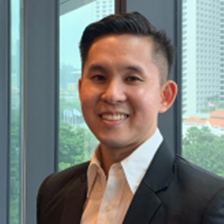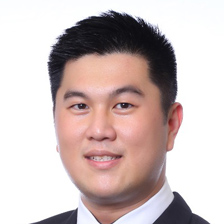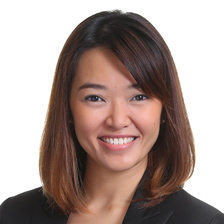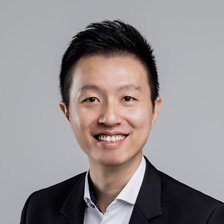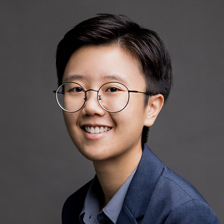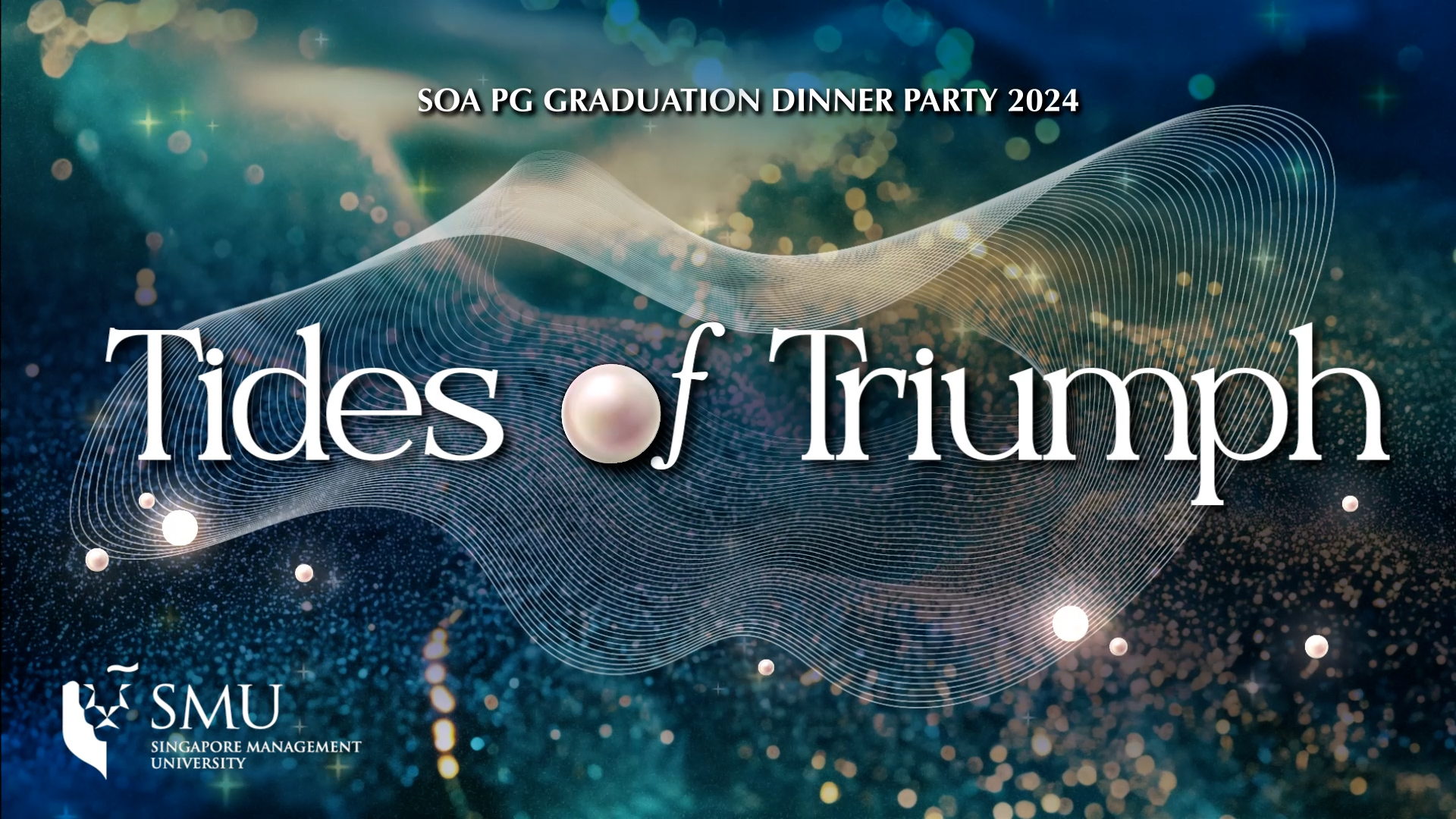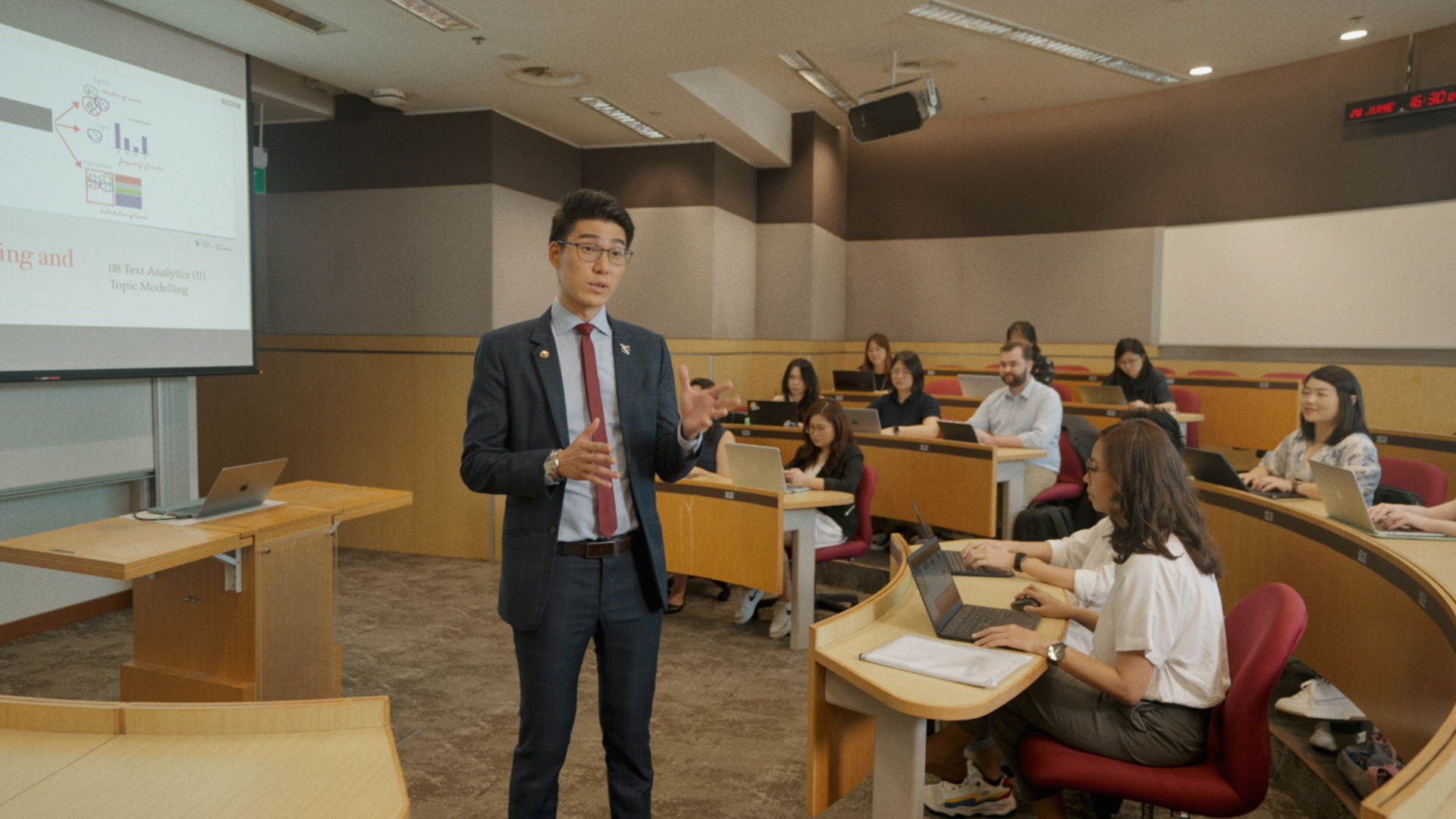-
18
MONTHS DURATION (FULL-TIME) (with flexibility to complete in 12 months)
-
24
MONTHS DURATION (PART-TIME)
-
SGD 63,220 TUITION FEE (INCLUSIVE OF GST)
Goods and Services Tax (GST) is a tax collected on behalf of the Singapore Government and will be charged at the prevailing rate
-
Application Closes
May 2026 (for August 2026 intake)
-
PRE-REQUISITES
Good Bachelor's Degree
Sufficient background in Accounting/Finance/Statistics/Business
SMU Admissions Test / GMAT / GRE
TOEFL / IELTS (if your undergraduate studies were not conducted in English)
-
Whatsapp +6568085450
For new admissions and programme enquiry
-
Chat with our friendly MSA Ambassadors
About The Master of Science in Accounting (Data & Analytics)
Designed to be industry and profession centric, the SMU MSA aims to build our graduates into competent professionals. It combines the practical use of the latest analytics technology and data sets as well as real-world experience using actual company cases and innovative teaching pedagogy such as the SMU-X. This knowledge of how and where to apply technological expertise in authentic settings will enable you to perform the higher-level tasks that are increasingly expected of accountants.
Why pursue the MSA?
-
1
First of Its Kind Programme in Asia
Be part of the first Master’s in Accounting degree programme in Asia that equips students with essential programming skills for critical business decision making. Armed with machine learning and data analytics skills, you will excel in using data to streamline processes, optimise resources and forecast future revenues.
-
2
The SMU-X Experience
Learn through real-life industry projects, develop interdisciplinary problem-solving techniques, and receive active mentoring from faculty and industry partners.
-
3
Internships & Global Immersion Programme
Enhance your skills through industrial internships and overseas study immersion programmes or exchanges that are an essential part of equipping you with the real-world and international perspectives you need in order to excel.
-
4
Recognised by Industry Partners
Benefit from the various aspects of a pioneering MSA programme well-recognised by leading corporations in the finance and business world and guided by a dedicated data analytics advisory board.
Class Profile
-
 Age Range
Age Range20s - 40s
-
 International Students
International Students80%
-
 Nationalities
Nationalities14
-
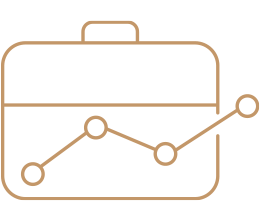 Average Years of Work Experience
Average Years of Work Experience6.6 yrs
-
 Average GMAT
Average GMAT683

Testimonials
Industries MSA Graduates Work In
-
 Financial Services
Financial Services45.45%
-
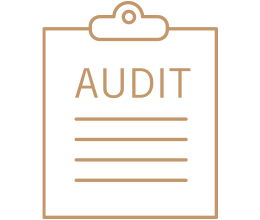 Audit / Accounting
Audit / Accounting18.18%
-
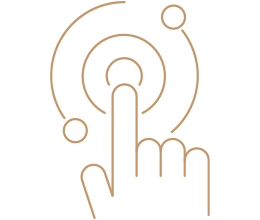 Technology
Technology18.18%
-
 Healthcare
Healthcare9.09%
-
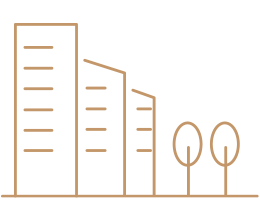 Real Estate
Real Estate9.09%

Programme Details
Programme Calendar
The MSA is designed for professionals who are interested in developing expertise in applying data technology into their domain knowledge to solve business problems, especially in the finance and accounting sectors. The availability of massive amounts of data has created a high demand for skilled data analytics professionals who can analyse such data and obtain the insight needed for informed decision-making. This is extremely vital to accounting and financial services firms as they have been dealing with large amounts of information produced by their clients.
Full-time
Part-time
Programme Information
Accounting and finance professionals are increasingly expected to use big data to facilitate daily business decision. The SMU MSA aims to build you into a competent and future-ready professional. The programme combines the practical use of the latest analytics technology and data sets, as well as real-world experience, using company cases with innovative teaching pedagogy such as the SMU-X for students to learn how to analyse large amount of data to uncover patterns and insights. This knowledge of how and where to apply technological expertise will enable you to perform at the higher level needed to give your firm a valuable competitive advantage.
Course Structure
The MSA programme consists of 15-course units (CU), including 11 CU discipline courses, 1CU SMU-X capstone course, 2CU either from Internship and/or Elective courses and 1CU Professional Development course taught over 24 months on a part-time basis or over 12-18 months on a full-time basis, commencing in August of each calendar year.
Full-time students with working experience less than three years will continue from August to January after Term 3 for an internship and/or global immersion programmes. Part-time students and students with three years of working experience or more will be exempt from the internship graduation requirement. Part-time students will be enrolled in the evening classes. All students will officially graduate around February and attend the graduation ceremony in July or August.
Booster
- Financial Reporting and Analysis in the IFRS World
- Managing Sustainable Value Creation
Analytics
- Applied Statistics for Data Analysis
- Programming with Data
- Data Management
- Forecasting and Forensic Analytics
- Analytics for Value Investing
- Analytics for Financial Instrument
- Visual Analytics for Accounting
- Accounting Processes and Analysis
- Automation for Finance Transformation
- Blockchain and the New Economies
- Modern AI Applications in Business
- Data Governance and Quality
- Sustainability Accounting and Analysis
- Exchange/Overseas Immersion Programme
- Relevant courses from other Postgraduate Programmes
Professional
- Accounting Analytics Capstone (SMU-X)
- SMU Professional Development Courses
- Internship
Activities
- Industry Talks
- Masterclass
- Student Workshops
- Activities
- Volunteer/Community Service Projects
a. Financial Reporting and Analysis in the IFRS World
Acquire an in-depth knowledge of the latest IFRSs as well as the standard-setting process and the conceptual framework behind the standards. Learn about recognition, measurement, presentation and disclosure of various elements of financial statements as well as its implications for financial analysis.
b. Managing Sustainable Value Creation
This course aims at providing students with an understanding of topical issues in managing value creation processes with accounting and strategic tools. Participants will learn how strategy, sustainability, culture, accounting information, managerial controls, financial/project decisions, performance evaluation and management compensation and incentive schemes are linked to the value creation objective of the enterprise. They will also gain an understanding of the drivers of enterprise value, as well as examine how an enterprise can manage its overall operating performance and financial position to create and enhance value for stakeholders.
a. Applied Statistics for Data Analysis
This course aims at introducing the concepts of statistics methodologies and econometric approaches for searching analytical solutions to problems related in accounting and business with the practical use of big data. The use of statistical software R is integrated into most topics of the course. Topics include R-programming, Statistical Modelling, Linear Regression, Resampling Methods, Linear Model Selection and Regularization, Tree-based methods, Unsupervised Learning, etc.
b. Programming with Data
In this course students acquire foundational computer programming concepts and skills through Python, a widely used programming language. Upon successful completion of this course, the students will understand and be able to appropriately apply fundamental programming concepts including variables, functions, parameters, loops and conditions as well as basic data structures including arrays (lists in Python) and hash tables (dictionaries in Python) in simple applications. The course will further explore on concepts associated with data such as Datasets, DataFrames and exploratory data analysis. The course examines the outline provided above, from both technical and hands-on in-class lab sessions. Students of this class will be using development tools and techniques to learn and understand data analysis with Python and the main focus will be on learning fundamental and advance concepts in Python programming and data analysis.
c. Data Management
This course will cover fundamentals of relational database theory, important data management concepts, such as data modelling, database design, implementation, data access, and practical data- related issues in current business information systems. A series of in-class exercises, tests and a course project will help students understand the covered topics. Students are expected to apply knowledge learned in the classroom to solve problems based on real-life business scenarios, while gaining hands-on experiences in designing, implementing, and managing database systems.
d. Visual Analytics for Accounting
This course will introduce students to principles and techniques for data visualisation, an important means by which accountants can communicate insights obtained from data modelling to their intended recipients. Students will learn how to construct visualisations (bar charts, histograms, scatter plots, pie charts, etc) and develop dashboards and other interactive visualisations to support decision-making in accounting. They will also learn how to design and construct analytical visual models to solve accounting-related problems.
e. Automation for Finance Transformation
This course is tailored to equip finance and accounting professionals with the expertise and skills required to automate and optimize financial processes using Python and Microsoft Power Automate. Participants will gain in-depth knowledge of Python RPA libraries, advanced web scraping methodologies, data manipulation techniques, and API integration strategies. The course also covers automation of email processing and explores the robust functionalities of Power Automate for both web and desktop automation. Through practical applications and tackling of real-world problems, the course aims to prepare participants to implement intelligent automation solutions to a successful finance transformation.
f. Forecasting and Forensic Analytics
This course explores how financial statement data and non-financial metrics can be linked to business strategy and future enterprise performance. Students will use analytics techniques acquired from prior courses to explore how data is used to assess what drives financial performance and to forecast future financial scenarios. By the end of this course, students will understand how financial data and non-financial data interact to forecast events, detect financial discrepancies and frauds, predict corporate default, optimize operations, and determine business strategy. Some cognitive analytics methods such as text analytics, neural networks and deep learning will also be introduced. This course has been designed to equip students with analytics mind-set to create strategy and make better business decisions.
g. Analytics for Value Investing
This course examines quantitative models and techniques used by securities analysts and investment managers to identify and interpret patterns in accounting and other financial data for making value-based fundamental investing decisions. The course will discuss extant empirical evidence on value investing strategies over the past decades. Students will then learn to develop their own quantitative strategies, in the context of a value-based investing, framework, to predict financial performance and distress risk of companies as well as to uncover securities that can potentially yield superior investment returns. The course will involve developing, algorithmic models to analyze large-scale financial data, drawing inferences from statistical results, and back-testing the models for their predictive power. The advantages and pitfalls of such models—including issues of data selection, and behavioral and institutional biases—will also be discussed. The skills taught would be useful for students intending to pursue a career in securities analysis, investment management, or corporate finance.
h. Analytics for Financial Instruments
In this course, students will be introduced to the various financial instruments that can be traded in the capital markets. In particular, this course will focus on stocks, bonds, and derivatives (such as options and futures) and how statistical tools can be applied to value and analyse these important instruments. In addition, students will be able to learn how to extract basic financial data from public sources (such as Yahoo Finance) and how these data can be used by managers to make informative investment decisions for their firms. More importantly, students will also be taught the application of financial theories such as Modern Portfolio Optimization, Fixed Income Analysis, Black Scholes Option Pricing Model, Hedging, Swaps, etc. Additional topics such as risk management and impairment models will also be introduced, and the focus will be on practical application.
This module is suitable for students who wish to work for financial institutions as it exposes them to the analysis of the various financial instruments that are available in the market, how to account for impairment in values of these instruments, and how to make optimal portfolio decisions for investment purposes.
i. Accounting Processes and Analysis
In today’s digital environment, data is the new strategic asset of organisations. The quality of data within the information systems affects the effectiveness of decision making and the ability of the organization to compete. As a strategic business partner, accounting professionals are expected to have a solid understanding of (1) key information qualities and critical information technologies that drive the information systems; (2) core accounting processes that allow an organization to operate effectively and efficiently; (3) risk-centric approach to analyse and improve business processes, and (4) vital organizational and IT governance and internal control concepts that can be applied to manage risks.
a. Data Governance and Quality
This course aims to provide students with an understanding of what good management is, the critical components of data management, and how these directly impact business performance. Students will learn how data management is integral to the strategic direction of the business, how data is governed through its entire lifecycle, the benefits of various components of solid data management, and how it may be best leveraged to drive business outcomes. Students will be equipped to deploy best data management practices for whichever business function they are in to create a strategy and make better-informed business decisions.
b. Blockchain and the New Economies
This course introduces you to the blockchain ecosystem, from concept to evolution, from technologies to applications. Students will learn the defining characteristics of blockchain technologies and learn to design, develop and evaluate the application of blockchain technologies in various settings for problem solving.
c. Modern AI Applications in Business
This course covers some of the advanced methods in the field, with hands-on application so students will be ready to embrace the future of analytical practice using machine learning, deep learning and large language models algorithms.
d. Sustainability Accounting and Analysis
This course is designed to equip students with the knowledge and skills required to understand and analyze sustainability reports. It covers the principles, frameworks, and standards of sustainability reporting, as well as the practical aspects of data collection, analysis, and presentation.
Besides the Elective courses above, students can also opt for the Global Immersion Programme and/or relevant courses from other Programmes.
a. Accounting Analytics Capstone (SMU-X)
This SMU-X course offers an experiential learning opportunity that allows students to translate classroom knowledge and theory into practical solutions for real organizations. Through this student consultancy project, students learn how to solve complex business problems with guidance from the faculty and project sponsor mentors, from problem definition to final client presentation – while simultaneously testing their skills in real world settings. The course will focus on examining accounting processes and applying data-driven analytics and insights so as to identify and create accounting delivery efficiencies.
b. Internship
An internship experience provides students with an opportunity to gain first-hand exposure to working in the real world. It enables student to explore career interests while applying knowledge and skills learned in the classroom to a work setting. The experience also helps students gain a clearer sense of the skills they need to learn and provides an opportunity to build professional networks. Past experience has shown that an internship will significantly increase the likelihood of permanent job offers.
Students can choose to take up a part-time internship assignment or full-time internship assignment by clocking at least 400 hours to qualify for a 1-course unit. Part-time students and students with three-year relevant working experience and above will be exempted from the internship graduation requirement.
c. SMU Professional Development Courses
Our holistic postgraduate experience delivers learning opportunities that support students in gaining multi-dimensional skills, insight and knowledge, with preparedness to chart a path to success for themselves, their organisation and industry. Considered an integral part of the learning experience is our Postgraduate Professional Development Series (PDS). This series, delivered by SMU faculty who are leaders in their fields and supported by trained industry experts, complements classroom-based learning with provocative, interactive workshops that are key to sustained personal and professional growth. You will be able to select and self-register for the workshops you qualify for during designated dates throughout the year, completing the PDS as part of your graduation requirements. You’ll find the topics engaging and diverse, ranging from interpersonal effectiveness and communication, critical/creative thinking skills and negotiation to leadership, organisational behaviour, data analytics, spreadsheet modelling, innovation and business sustainability.
Events

How to Apply
- Application Period
- General Instructions
- Applicant Self-Service
- Admission Requirements
- Admissions Tests & Score Reports
Application Period
The online application for the August 2026 intake starts 1 August 2025 with the following admissions phases:
Phase 1 - 1 Aug to 31 Aug 2025 (Early Admission)
Phase 2 - 1 Sep to 31 Dec 2025
Phase 3 - 1 Jan to 31 March 2026
Phase 4 - 1 Apr to 31 May 2026
All supporting documents including GMAT/ TOEFL/ IELTS scores must reach us by the stipulated deadlines above.
Please get ready contact details of two referrals for uploading and read the Applicant's Guide to Admission before submitting your application online.
How to Submit Your Application
The first step is to complete the online application form and attach copies of the required documents as instructed. Keep a copy of your submission for your records. Your application will only be processed when we have received all the required documents and payment.
Documents to submit
- Updated Resume
- Undergraduate Degree Scroll
- Undergraduate Degree Transcript
- Any other supporting documents
- SMU Admissions Test/GMAT/GRE
- IELTS/TOEFL if undergraduate degree was not taught in English
- Passport
- Two References: please provide the name, email and contact number of two referees (they can be from your colleagues, superiors or friends). Referees will be notified to complete their referral forms online.
Eligible candidates will be shortlisted for an interview with the Admissions Panel.
Other Information You Should Note:
- Correspondences will be sent mainly by email, please ensure that you check your email regularly.
- Interviews will be conducted between October to June for shortlisted applicants.
- Successful applicants will be informed within 1-2 weeks after the interview.
- Our FAQs cover important information useful to you during your application phase, please refer to them and contact our office for assistance should the nature of your enquiry fall outside of our FAQs.
Once you have submitted your application and have received the application number confirmation email, you can use the Applicant Self Service functions to check your application status or update your contact information.
Please refer to the Applicant's Self Service Guide, please click here.
The application criteria for the MSA programme are as follows:
- Applicants must demonstrate good prior academic performance in an undergraduate degree from a recognised institution of higher learning.
- Applicants must have sufficient background in Mathematics/Calculus.
- Applicants have the option to take SMU Admissions Test (SMUAT) or GMAT or GRE as an admission test for application to the programme.
- Applicants with relevant working experience will have an added advantage.
- Shortlisted applicants will be invited for an online interview by members of the MSA Admissions Panel.
- Applicants must show proficiency in the English language. A TOEFL (min. score of 90) or IELTS (min. score of 6.5) test is required if the applicant's undergraduate degree was not conducted in English.
You are required to take an Admission Test for admission to the MSA programme, regardless of your academic background or prior qualifications. You may choose to take the GMAT (Graduate Management Admission Test) / GRE (Graduate Record Examinations General Test), or the SMUAT (Singapore Management University Admissions Test). If you have previously taken the GMAT or GRE, it must have been taken within five years of the date of your application submission.
You are strongly encouraged to take the SMUAT if you do not have a GMAT/GRE Score Report. Details of this test will be provided to you once your application has been submitted.
The following groups of candidates are exempted from GMAT/GRE/SMU Admissions Test:
- SMU Bachelor’s degree graduates with a minimum cGPA of 3.0/4.0 (within 5 years of graduation)
- SUTD/NUS/NTU/SUSS/SIT Bachelor’s degree graduates with a minimum cGPA of 3.5/5.0 (within 5 years of graduation)
However, meeting the cGPA academic input does not guarantee acceptance and candidates may still be asked to take the GMAT/GRE/SMU Admission Test.
If your undergraduate studies were not taught in English, you must take the IELTS (International English Language Testing System) or TOEFL (Test of English as a Foreign Language). An IELTS (min. score of 6.5) or TOEFL (min. score of 90) report is required. Either test must be taken within the last two years of your application submission.
You will need to email the unofficial results of your test to the SMU Admissions Office and make a request at the relevant test centre to send your official score report to SMU.
We adopt a holistic approach in our selection process and the overall quality of the applicant determines his/her admission to the programme. This would include prior academic performance at university, work experience, referee reports, interview scores, etc.
Official score reports can be sent via the following Institution Codes:
TESTS INSTITUTION CODES
GMAT: F8D-3B-44
GRE: 2861 (Department Code: 4001 - Accounting)
TOEFL: 9014 (Department Name: Accounting)
SMUAT
The SMUAT is an online test comprising three components: verbal, numerical, and inductive reasoning. This Fact Sheet contains further information. To register for the SMUAT, you will be required to complete the MSA application first of S$100. After you have submitted the application, please log in to the Applicant Self Service portal to make an additional payment of S$125 for the test and send us the payment receipt via email: SOAMasters@smu.edu.sg. Once we have processed the payment, we will get in touch with you to send the test information over email.
More information about SMUAT is available here.
GMAT
More information about GMAT is available on the GMAT website. To enhance the competitiveness of your application, you should attain a GMAT score of 600 or higher, OR a GMAT Focus edition score of 595 or higher (try a GMAT mini quiz)
GRE
More information about GRE is available on the GRE website. To make your application more competitive, you should achieve a minimum GRE combined score of verbal and quantitative components of 312.
Programme Fees
S$100 (inclusive of GST)
Application fee is non-refundable and applicable at the time of submissions.
- S$5,400 for Singaporeans & PR
- S$5,500 for Foreigners
Registration and Deposits fee is non-refundable* and payable on acceptance to the programme. The registration fee of S$400 or S$500 covers matriculation, examination fees, orientation activities, library and computer account. The deposit fee of S$5,000 will contribute to first billing of the tuition fee.
S$63,220.00 (inclusive of GST)
First billing of fees in term 1 and second billing of fees in term 2 for full-time students
First billing of fees in term 1 and second billing of fees in term 4 for part-time students
Payment notice will be sent to students one month prior to term commencement.
- Tuition fees are locked in once the student enters the programme. Singapore Management University reserves the right to alter tuition fees for new incoming cohorts when required.
- For the avoidance of doubt, the deposit shall form part of the total tuition fees for the programme, however, SMU will not refund the deposit should a student withdraw from the programme at any time after accepting the offer.
- Goods and Services Tax (GST) is a tax collected on behalf of the Singapore Government and will be charged at the prevailing rate.
Scholarships and Financial Aid
The SMU MASTERS ASEAN Scholarship is to incentivize good applicants from ASEAN countries to pursue SMU Master’s Degree programs and to increase the diversity and overall learning experience in the classroom. Recipients of the scholarship are expected to be good ambassadors of SMU in general and to participate actively in student development and outreach activities.
One scholarship valued at S$10,000 (inclusive of GST) will be awarded for each Academic Year.
ELIGIBILITY CRITERIA
To be eligible for this Scholarship, applicants must meet the following criteria:
- Citizen of an ASEAN member country or observer nation (PNG and Timor-Leste)
- Applicants must matriculate into the SMU Postgraduate programme (no deferment)
- Excellent academic background
- Not a concurrent recipient of any other SMU-funded scholarships
Application is not required for the SMU MASTERS ASEAN Scholarship, which is awarded to students in the MSA Program after due consideration by the faculty based on the criteria listed above.
ELIGIBILITY CRITERIA:
1. Academic Excellence: Generally with a minimum GPA of 4.5 out of 5.0 or equivalent in undergraduate studies.
2. Leadership Potential: demonstrated leadership experience through extracurricular activities, work experience, or community service.
3. Global Perspective: Evidence of international experience, such as studying abroad, international internships, or multicultural engagement.
4. Personal Statement: A compelling personal statement outlining career goals and how the scholarship will help achieve them.
ELIGIBILITY CRITERIA:
1. Academic Performance: Generally with a minimum GPA of 4.0 out of 5.0 for the $10,000 level and 3.5 out of 5.0 for the $5,000 level.
2. Professional Achievements: Relevant work experience or internships in accounting or related areas.
3. Extracurricular Involvement: Active participation in relevant clubs, organisations, or community service.
4. Personal Statement: A well-written personal statement demonstrating the candidate’s commitment to accounting.
ELIGIBILITY CRITERIA:
1. Interest in Sustainability: Demonstrated coursework, projects, or volunteer work in sustainability.
2. Academic Achievement: Generally with a minimum GPA of 3.5 out of 5.0 or equivalent in undergraduate studies.
3. Project Proposal: Written proposal of what you will plan to do when you study in SMU related to sustainability.
4. Personal Statement: A personal statement detailing the candidate’s passion for sustainability and future aspirations in the field.
ELIGIBILITY CRITERIA:
1. Entrepreneurial Experience: Demonstrated experience in starting or managing a business independently or within a family business.
2. Academic Achievement: Generally with a minimum GPA of 3.5 out of 5.0 or equivalent in undergraduate studies.
3. Business Proposal: The candidate must submit a business proposal outlining an entrepreneurial venture they are currently involved in or plan to develop, along with evidence of innovative thinking and the potential impact the business could have on the industry or community.
4. Personal Statement: A personal statement describing the candidate’s entrepreneurial journey, challenges, and future goals.
ELIGIBILITY CRITERIA:
1. Leadership Experience: Proven leadership experience in academic, professional, or community settings, with tangible examples of initiatives led and outcomes achieved.
2. Academic Achievement: Generally with a minimum GPA of 3.5 out of 5.0 or equivalent in undergraduate studies.
3. Proven Leadership: A strong recommendation letter from referees highlighting the candidate’s leadership qualities, skills, and impact in academic, professional, or community settings.
4. Extracurricular Activities: involvement in leadership roles in extracurricular activities or organisations.
5. Personal Statement: Written proposal of what you will plan to do when you study in SMU to display your leadership quality.
The CIMB ASEAN Scholarship is committed towards helping young talent in need to realise their dreams. Going beyond financial support, the Scholarship programme provides exciting professional development and a mentor support system designed to empower the region's young talent to turn their lives around and make a difference for those around them. Recognizing the evolving nature of the banking industry, CIMB welcomes applicants from a wide variety of academic disciplines, such as those studying Computer Science, Data Science and Psychology, apart from degrees traditionally associated with a career in banking such as Accounting, Economics, and finance. To find out more, please visit here.
Established in 2024, the objective of the EY Excellence Scholarship is to motivate exceptional postgraduate students in Singapore Management University’s School of Accountancy, with the aim of spurring them to greater heights of academic excellence. One scholarship valued at S$15,000 (inclusive of GST) will be awarded for each Academic Year.
ELIGIBILITY CRITERIA
- Singapore Citizen or Singapore Permanent Resident.
- Must matriculate into the SMU MSA Program (no deferment)
- Good academic achievements (minimum cumulative GPA of 3.0)
- While not a requirement, consideration will be given to postgraduates with demonstrated financial needs.
Synonymous with both prestige and a willingness to serve Singapore, the Lee Kuan Yew (LKY) Scholarship marks Singapore’s continuous effort to recognise outstanding individuals with the aptitude and inclination to contribute to our society.
ELIGIBILITY CRITERIA
Applicants, who must be Singapore citizens, will be assessed holistically. This includes their track record of leadership and achievement in their fields of pursuit or profession. Applicants should also have the potential to excel in their fields/professions, which will contribute to and benefit Singapore and our society.
Find out more about the scholarship here.
For more information, please contact psc@psd.gov.sg
The SG:D Scholarship (Postgraduate) is an industry scholarship that empowers individuals interested in pursuing ICM-related studies at the Masters or PhD level. Individuals pursuing postgraduate studies in specialised ICM-related areas such as Artificial Intelligence, Cybersecurity, Analytics, Immersive Media, and Digital Content Creation can chart their future with this scholarship.
ELIGIBILITY CRITERIA
Applicants must meet the following criteria:
- Singapore citizen;
- A postgraduate program has to be ICM-related and offered by a local autonomous university, local arts institution or renowned overseas university;
- Current student taking his/her first postgraduate programme with minimally one academic year of study remaining from the point of scholarship award; or
- Candidate who has yet to enroll in any postgraduate programmes and will commence his/her first Masters or PhD within one year from the point of scholarship award;
- Online or Distance learning courses and part-time PhD programmes are not eligible.
- Not a recipient of, or hold any other scholarship or other award of a monetary nature (excluding bursary and financial aid); and
- Priority will be given to non-public officers. Public officers are encouraged to apply in-house schemes available in their organisations.
- Fresh graduates or professionals are welcome to apply.
The SG:D Scholarship is currently open for application and closes each year on 31 March.
For more information, please visit the IMDA website.
LPDP is committed to preparing Indonesian future leaders and professionals through scholarships and encouraging research innovation through research funding. LPDP continues to move towards an organisation with high competitiveness, not only on a local scale, but on a regional and even international scale.
We are proud to share that SMU has been recognised as an approved Masters/PhD destination for “all subject” under the LPDP 2023 programme.
Please visit LPDP for more information. Apply for the LPDP scholarship here.
The Financial Services Authority of Indonesia (Otoritas Jasa Keuangan) is an Indonesian government agency which regulates and supervises the financial sector. The OJK Sponsorship is offered to OJK employees who are keen to pursue a Master or Doctoral degree in SMU. OJK employees may contact their HR department to find out more about the sponsorship and eligibility criteria.
- The SkillsFuture Level-Up Programme offers Singaporeans aged 40 years and above the opportunity to receive the SkillsFuture Credit (Mid-Career) Top-up of S$4,000. This credit is intended to help offset out-of-pocket tuition fees, starting from the Academic Year 2024/2025 intake, commencing on or after 1 May 2024. Please visit https://www.skillsfuture.gov.sg/level-up-programme for further details.
- up to 90% course fee subsidies are not eligible for MSA programme. Please visit https://www.skillsfuture.gov.sg/initiatives/mid-career/enhancedsubsidy for further details.
- Singapore Citizens with eligible Post-Secondary Education Account (PSEA) may utilize balance funds for tuition fees. Click here for more details.
- Students seeking financing aid may approach their local bank(s) directly to enquire and apply for the various study loan packages.
|
SMU Discount Scheme |
Eligibility |
Amount |
Exemption Discount* |
|
SMU Alumni Discount |
SMU UG/PG alumni |
$8,000 |
Up to 4 CUs exemption at $3,000 each (for alumni of local AUs and PUs) |
|
SC/PR |
Singapore Citizens/ Permanent Residents |
$5,000 |
|
|
Partner Universities and Local AUs (SMU/NUS/NTU/SIT/SUSS/SUTD) |
Partner Universities and Local AUs |
$4,000 |
|
|
ASEAN |
ASEAN nationals |
$3,000 |
|
|
Corporate |
Corporate Partners |
$6,000 |
*Only for specifically identified exempted courses with prior studies at PU/SMU, typically requiring a satisfactory performance for recognition. Note that exemptions may result in ineligibility of professional accreditations.
Each student is only eligible for one discount. Should a student qualify for more than one discount, only the higher discount will be applicable.
The Singapore Management University reserves the right to amend the discount schemes for new incoming cohorts when required.
Terms & Conditions Apply.
For more information, please call 6333 7777.
For enquiry on this, please contact:
Selva Kumaran
Senior Executive
DID: (65) 6661 2157
Email: selva.subramaniam@cimb.com
For more information, please call 6333 0033 or visit https://www.posb.com.sg/personal/loans/education-loans/posb-further-study-assist
Email: personalloans@dbs.com
The application must be with a joint applicant who is a Singaporean or Singapore PR. More details are available at http://info.maybank2u.com.sg/personal/loans/personal-credit/mb-education-loan.aspx
Contact Person:
Mr Javier Chan
Personal Finance Executive
DID: (65) 6338 6543
Email: chan@maybank.com.sg
For more information please call 1 800 323 0100 or visit http://www.rhbbank.com.sg/personal/loans/education_loan.html.
Contact Person:
Cheryl Chan
DID: (65) 8139 9820
Email: cheryl.chan@rhbgroup.com
For more information please call 1 800 438 3333 or visit https://www.frankbyocbc.com/products/investments/edu-loan/
Indian nationals admitted to SMU are eligible to acquire study loan against security given by them from SBI in India. Visit www.sbising.com for more details or call 1 800 724 7464 / 6228 1116.

FAQ
The MSA programme consists of 15-course units (CU), including 11CU discipline courses, 1CU SMU-X capstone course,2CU from internship and/or elective courses and 1CU professional development course taught over 24 months on a part-time basis or over 12-18 months on a full-time basis, commencing in August of each calendar year
There is only one admission intake per year in August.
Classes are conducted on weekday evenings from 7:00pm to 10:15pm and on some Saturdays 8:45am to 12:00pm and 1:00pm to 4:15pm. There will be no classes conducted during the daytime as the class is catered to both part-time and full-time students.
Each term will start approximately on the 3rd week of August. However, international students may be required to be in Singapore earlier to partake in Orientation and other activities which are required for the programme. Please contact us directly should you wish to find out the exact start date.
Assessment varies across courses but generally, it would comprise class participation, continuous assessment, group projects or cases, and a final examination.
Internship is an elective and is highly recommended for students with less than two years of working experience. Our Office of Career Services invites firms on-campus for career talks and networking sessions. They also provide assistance to students interested to locate an internship during their course of studies. Students gain firsthand experience working in the accounting industry.
MSA programme is not accredited with CA/CPA qualfication. If you are looking to become a CA/CPA, we recommend joining the MPA programme instead. You will need to apply to a professional accounting body for membership. The rule for advancement to CPA or CA status may differ from one professional body to another. In general, you would need to complete a set of examinations (which you may be partially exempted from) and meet the practical experience requirements. Candidates are encouraged to contact the various professional accounting bodies directly regarding qualifying requirements.
- Applicants must demonstrate good prior academic performance in an undergraduate degree from a recognised institution of higher learning.
- Applicants must have sufficient background in Statistics/Accounting/Finance/Business.
- GMAT or SMU Admission Test* is a compulsory requirement for admission to this programme.
- Applicants with post-undergraduate working experience will have an added advantage.
- Shortlisted applicants will be invited for an interview by members of the MSA Admission Panel. For international students, telephone interviews will be conducted if they are not in Singapore.
- Applicants must show proficiency in the English language. A TOEFL or IELTS test is required if the applicant's undergraduate degree was not conducted in English.
*More information about SMU Admission Test is available here. Candidates may only take the SMU Admission Test after they have submitted the online application form. Please contact the administration office - SOAMasters@smu.edu.sg to take the SMU Admission Test.
As a number of our courses in the programme requires student to be able to apply data technology into their domain knowledge, a good background in statistics/accounting/finance/business is essential to enable you to progress through these courses. Some of the criteria that will be used in evaluating the applicant's background in statistics/accounting/finance/business include:
- GMAT score with a minimum score of at least 60 percentile for quantitative component; or
- Satisfactory completion of some mathematical courses at a university level; or
- Have completed at least two mathematical courses at polytechnic level with minimum B grade; or
- An acceptable foundation in mathematics at GCE A-level or O-level or its equivalent.
Though work experience is not a compulsory requirement, it provides students with a valuable dimension to the course and will be considered favourably by the MSA Admission Panel.
In general we regard sponsorship by current or future employers as an important additional piece of evidence of your value to the employer and future career potential, but the admissions panel will not place undue weight on this.
Our accreditation from the professional bodies specifically states that our applicants must have a bachelor's degree. Applicants without a bachelor's degree will not be eligible for the programme.
Foreigners are eligible to apply as long as they hold an employment or dependent pass. For more information, please visit https://www.ica.gov.sg
We require applicants to take the GMAT (Graduate Management Admissions Test). GMAT measures basic verbal, mathematical, and analytical writing skills that you have developed over a long period of time in your education and work. The score report gives separate scores for the quantitative and verbal sections of the test, as well as a total score. There is also a short analytical writing section. The GMAT is used to ensure fairness, objectivity and validity in selection and provides supplementary information to that contained in the application form.
More information is found in the GMAT website. The website provides information about preparing and registering for the GMAT test.
In Singapore, you can take the GMAT at designated Pearson VUE test centers or online from your own computer. You must register for the exam on the official mba.com website, where you can then find available test dates, times, and locations to schedule your exam.
GMAT 600 or higher, OR GMAT Focus edition score of 595 or higher, OR GRE 312 (VR+QR)..
Yes, you can retake GMAT/GRE but retaking the test is only recommended if you believe you have under-performed significantly at the first attempt. Please be well prepared before you go for your GMAT/GRE test as GMAT/GRE can only be taken once a month. We will use your highest valid GMAT/GRE score.
If the rest of your application is completed, you can send it to us, even if you have not taken the GMAT/GRE. Candidates without GMAT/GRE or with low scores have the option to sit for the SMU Admissions Test (SMUAT). The SMUAT is an online test that can be done from home. However, if you don't sit for SMUAT, then we will need your GMAT/GRE score to assess your application. You should email us your unofficial scores as soon as you receive them and arrange with the test centre for the official score report to be sent to SMU. SMU's GMAT institution code for MSA is F8D-3B-44.
Every applicant is required to take the SMUAT/GMAT/GRE, regardless of their academic background or prior qualifications. Our applicants come from very diverse backgrounds with different types of academic qualification. SMUAT/GMAT/GRE is a useful common benchmark to assess the applicants objectively and fairly.
However, the following groups of candidates are exempted from SMU Admissions Test/GMAT/GRE:
- SMU Bachelor’s degree graduates with a minimum cGPA of 3.0/4.0 (within 5 years of graduation)
- SUTD/NUS/NTU/SUSS/SIT Bachelor’s degree graduates with a minimum cGPA of 3.5/5.0 (within 5 years of graduation)
However, meeting the cGPA academic input does not guarantee acceptance and candidates may still be asked to take the GMAT/GRE/SMU Admission Test.
GMAT/GRE scores are valid for 5 years after the test date. If your GMAT/GRE results are older than 5 years, you will need to re-sit your GMAT/GRE.
Minimum TOEFL iBT (90) / IELTS (6.5) score is required, as each applicant is evaluated on all the credentials.
TOEFL/IELTS scores are valid for 2 years after the test date.
There is only one admission intake in August each year. Applications start September the year before and closes on 31 May the following year, every year. Early application is encouraged as it is a rolling application cycle.
All applicants must complete an online application form. The application form requires details on educational background, professional training, employment and work experience, personal information, etc. Applicants must also provide a personal statement explaining why they want to take the programme and how it fits with their career aspiration. You will need to take the SMU Admission Test (SMUAT) or Graduate Management Admission Test (GMAT)/GRE. Candidates may only take the SMUAT after they have submitted the online application form. Please contact the administration office to take the SMUAT. For the GMAT or GRE, please arrange for the score report to be sent to SMU MSA either through your account or by contacting the test center. Applicants are also required to provide contacts and details of two referees (an automated email upon submission of application will be sent to them to fill up the referral form) and to attend an admission interview by members of the MSA Admission Panel.
Yes, there is a non-refundable application fee of S$100 (inclusive of GST). You are encouraged to pay by credit card or cheque payable to Singapore Management University. For international applicants, please make an online payment or by a bank draft/cheque payable in Singapore dollars to Singapore Management University.
Please refer here for the prevailing tuition fee, payable in two installments. Fees will be collected before the start of Term 1 and Term 2 for full-time students, and before the start of Term 1 and Term 4 for part-time students. In addition, a non-refundable registration fee of S$400 (inclusive of GST) (Singaporean/PR); S$500 (inclusive of GST) (Foreigner) is payable upon acceptance into the MSA programme. Students are required to pay a deposit of $5000 (inclusive of GST) upon acceptance into the programme. This is collected together with the registration fee and the deposit will be used to offset the first tuition fee installment. Click here for more details on the fees.
No, the tuition fee is the same regardless of the number of exemptions granted.
Selected scholarships are available for MSA programme and will be used to offset tuition fees. Scholarships are awarded based on merit and evaluated using several factors, including prior academic performance, admission test scores, employment history, anticipated contributions to the program, interview results, and career aspirations. Note: Not all students will receive the scholarship. For education loans, there are some banks in Singapore that provide study loans too. These typically require guarantors who must be citizens or permanent residents of Singapore. Please contact banks for more information and requirements.
No. The Singapore CPF Board does not allow CPF funds to be used for postgraduate studies.
Only shortlisted applicants are invited for a personal interview. This will allow us to assess the applicants holistically, taking into account his/her achievements in all areas and to select candidates who have the commitment, experience, motivation and potential to benefit from, and contribute to, the programme.
Our Graduate Programmes & Professional Development (GPPD) Office will assist all international students who have been admitted to the programme, in their application for student pass, which is processed and approved by the Immigration Checkpoints Authority (ICA). The student pass is valid for the whole duration of the course of study. Please click here for more details on the application of the student pass.
- A valid passport
- A letter of offer from SMU (You must have done your online acceptance)
Application for student pass is done online at the Immigration Checkpoints Authority (ICA) website. You must receive a SOLAR application number from SMU before you can submit your application online. The Graduate Programmes & Professional Development Office will be liaising with all accepted international applicants with regards to student pass application. Correspondences will be sent by email, thus please ensure that you have stated a valid email address in your application.
For students who require visa to enter Singapore, the student pass application includes a Single-Journey Entry Visa for ONE-MONTH stay in Singapore till all formalities has been completed upon your arrival in Singapore. We will send the approval letter via email once your student pass is approved, so that you may use the letter as a visa to enter Singapore. You are not required to apply for a separate visa.
If you wish to visit Singapore for personal reasons, the Immigration and Checkpoints Authority (ICA) website will give you a list of countries whose nationals require visas to enter Singapore.
With effect from 1 March 2000, Immigration Checkpoints Authority requires all applicants for long-term passes, including Student's Passes, to undergo a medical examination. This includes a general physical medical examination, a chest x-ray and a test for AIDS-causing Human Immunodeficiency Virus (HIV). The examination must be conducted by approved hospitals / clinics in Singapore . This rule applies to anyone visiting Singapore for 6 months or more for the purpose of education.
If you are a new applicant and not in Singapore, the medical examination can either be done in your home country or in Singapore by a qualified doctor.
However, the medical examination required for subsequent renewal of the Student's Pass must be done in Singapore. The doctor must record and certify the results of the medical examination in the designated medical report form.
The medical report should not be issued more than three months from the submission or renewal date of your application; and should be translated in English. If a medical report is submitted to the Immigration & Checkpoints Authority or Ministry of Manpower not more than two years from your submission date, there is no need to re-submit a fresh medical report.
You can also walk in to Raffles Medical Health check clinic, they are open from 8.30am to 4pm and is the closest to SMU.
Their address as follows:
Raffles Medical@ Raffles Hospital Health Check Counter, 585 North Bridge Road
On early termination of your studies (e.g. withdrawal or refused re-admission) at the University, students should bring their Student's Pass to the Immigration and Checkpoints Authority (ICA) within 7 days of cessation of the studies for cancellation.
A full-time matriculated international student of the university holding a valid Student's Pass may take up employment in Singapore during the vacation and is exempted from applying for a work permit as stated in the Work Permit Exemptions Notification.
However, during term time, a student holding a valid Student's Pass is only allowed to work part-time for less than 16 hours per week. A letter of consent is not required from the Immigration and Checkpoints Authority or the university.
We do not arrange accommodation for students; however, there is a variety of accommodation available in Singapore such as student hostels and private apartments. Click here for more information on accommodations.
Singapore uses the Red and Green Channel system for customs clearance. Proceed to the Red Channel if you carry the following items or are not sure:
- Prohibited items
- Controlled or restricted items
- Taxable or dutiable items exceeding your GST Relief or duty-free concession
- Items for which no GST Relief or duty-free concession is granted
If you have nothing to declare, please use the Green Channel. Please visit the Singapore Customs website for more information.
You can obtain information on Singapore's tourist attractions from the Singapore Tourism Board (STB) website, Visit Singapore.
Your monthly expenditure is highly dependent on your course of study, lifestyle and personal needs. As a rough guide, an international student may expect to incur the following:
| Item | Amount |
|
Accommodation |
$500 - $1500 per month (inclusive of GST) |
|
Utilities |
$80 - $150 per month (inclusive of GST) |
|
Food |
$300 - $450 (inclusive of GST) |
|
Public Transport |
$50 - $100 per month (inclusive of GST) |
|
Telecommunications |
$30 & above (inclusive of GST) |
|
Books & Stationery |
$100 - $300 per term (inclusive of GST) |




